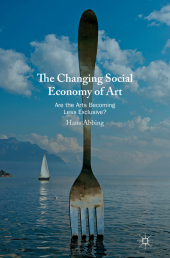 Neuerscheinungen 2019Stand: 2020-02-01 |
Schnellsuche
ISBN/Stichwort/Autor
|
Herderstraße 10
10625 Berlin
Tel.: 030 315 714 16
Fax 030 315 714 14
info@buchspektrum.de |

Hans Abbing
The Changing Social Economy of Art
Are the Arts Becoming Less Exclusive?
1st ed. 2019. 2019. v, 257 S. 30 SW-Abb. 235 mm
Verlag/Jahr: SPRINGER, BERLIN; SPRINGER INTERNATIONAL PUBLISHING 2019
ISBN: 3-03-021667-5 (3030216675)
Neue ISBN: 978-3-03-021667-2 (9783030216672)
Preis und Lieferzeit: Bitte klicken
Is art for everybody? Why do art lovers attach so much value to authenticity, autonomy and authorship? Why did the arts become so serious in the first place? Why do many artists reject commerce and cultural entrepreneurship? Crucially, are any of the answers to these questions currently changing? Hans Abbing is uniquely placed to answer such questions, and, drawing on his experiences as an economist and sociologist as well as a professional artist, in this volume he addresses them head on.
In order to investigate changes in the social economy of the arts, Abbing compares developments in the established arts with those in the popular arts and proceeds to outline key ways that the former can learn from the latter; by lowering the cost of production, fostering innovation, and becoming less exclusive. These assertions are contextualized with analysis of the separation between serious art and entertainment in the nineteenth century, lending credence to the idea that government-supported art worlds have promoted the exclusion of various social groups. Abbing outlines how this is presently changing and why, while the established arts have become less exclusive, they are not yet for everybody.
Chapter 1: Preface.- Chapter 2: The Triumph of Serious Art.- Chapter 3: Authentic Art and Artists.- Chapter 4: Exclusion.-Chapter 5: Distrust of Commerce and Commercialism.- Chapter 6: Sharing Art.- Chapter 7: Conclusion.
Hans Abbing is a visual artist and economist. He is also Emeritus Professor in Art Sociology at the University of Amsterdam, the Netherlands, and teaches MA Cultural Economics and Cultural Entrepreneurship at the Erasmus University of Rotterdam, the Netherlands. His bestselling book Why are Artists Poor? The Exceptional Economy of the Arts (2002) has been translated into several languages and continues to be used in both undergraduate and postgraduate courses worldwide.


